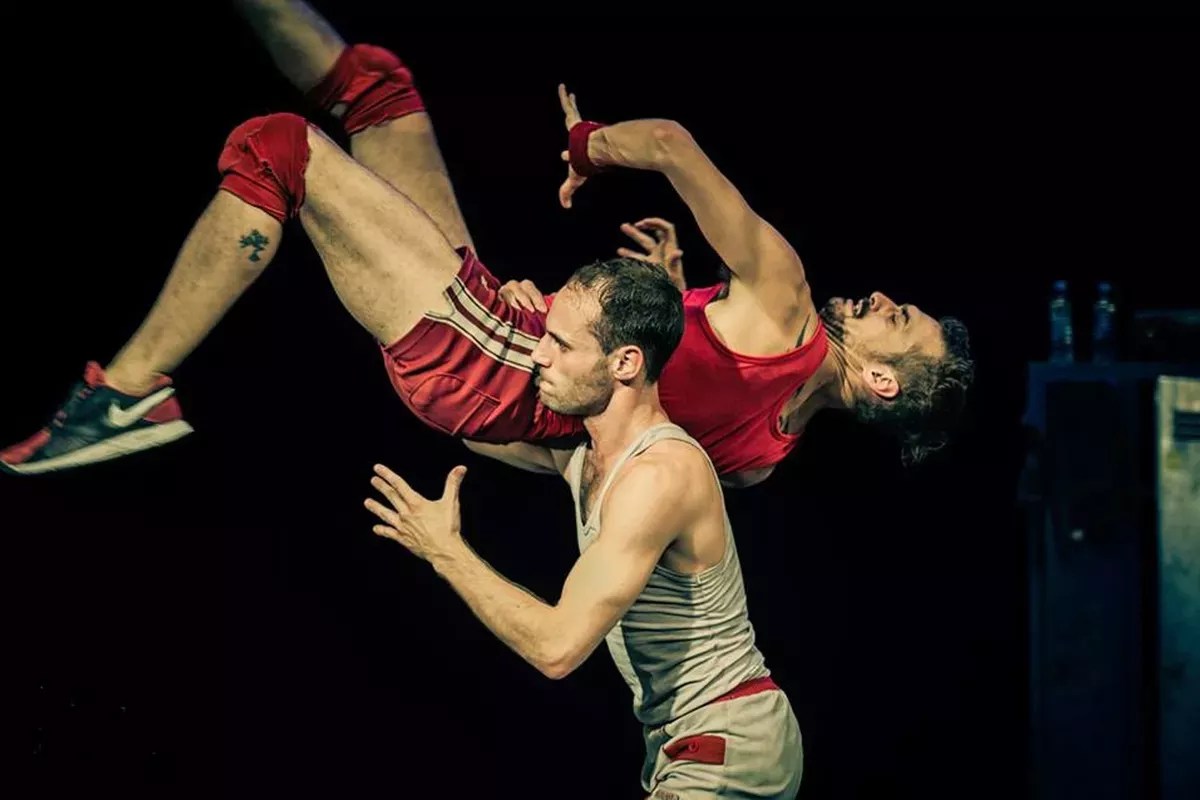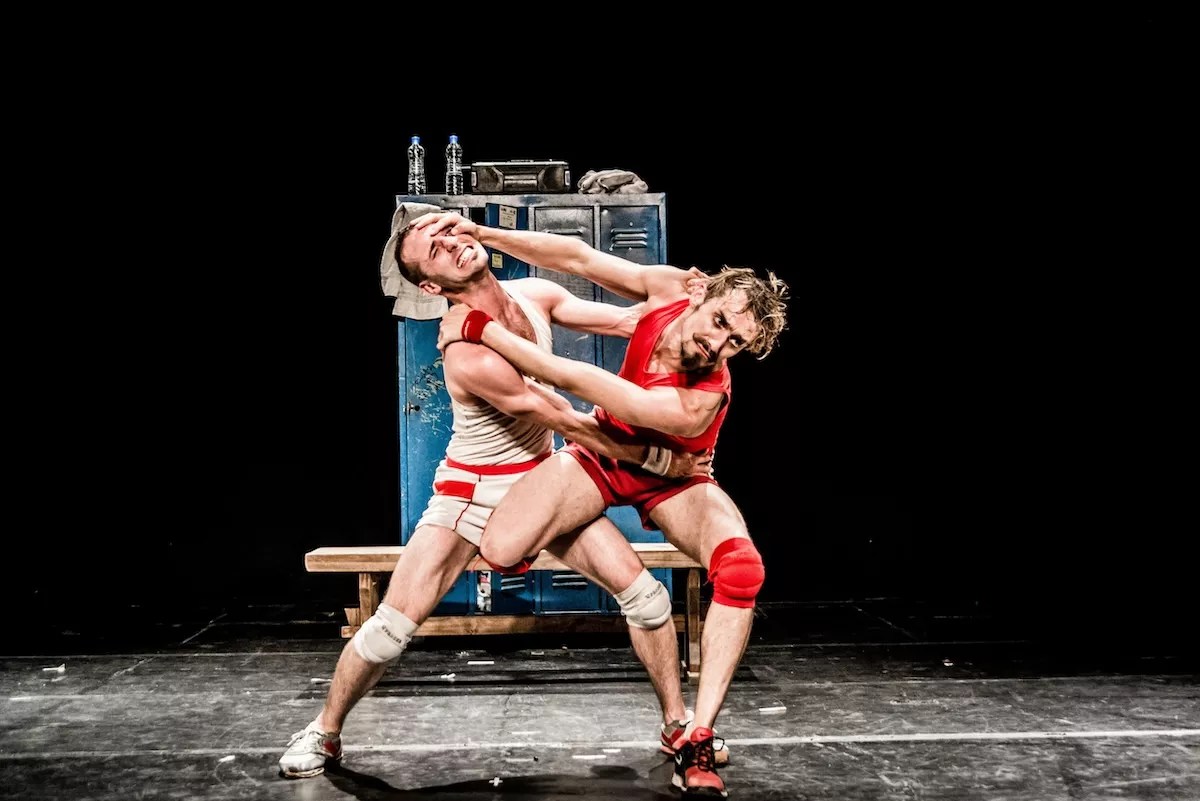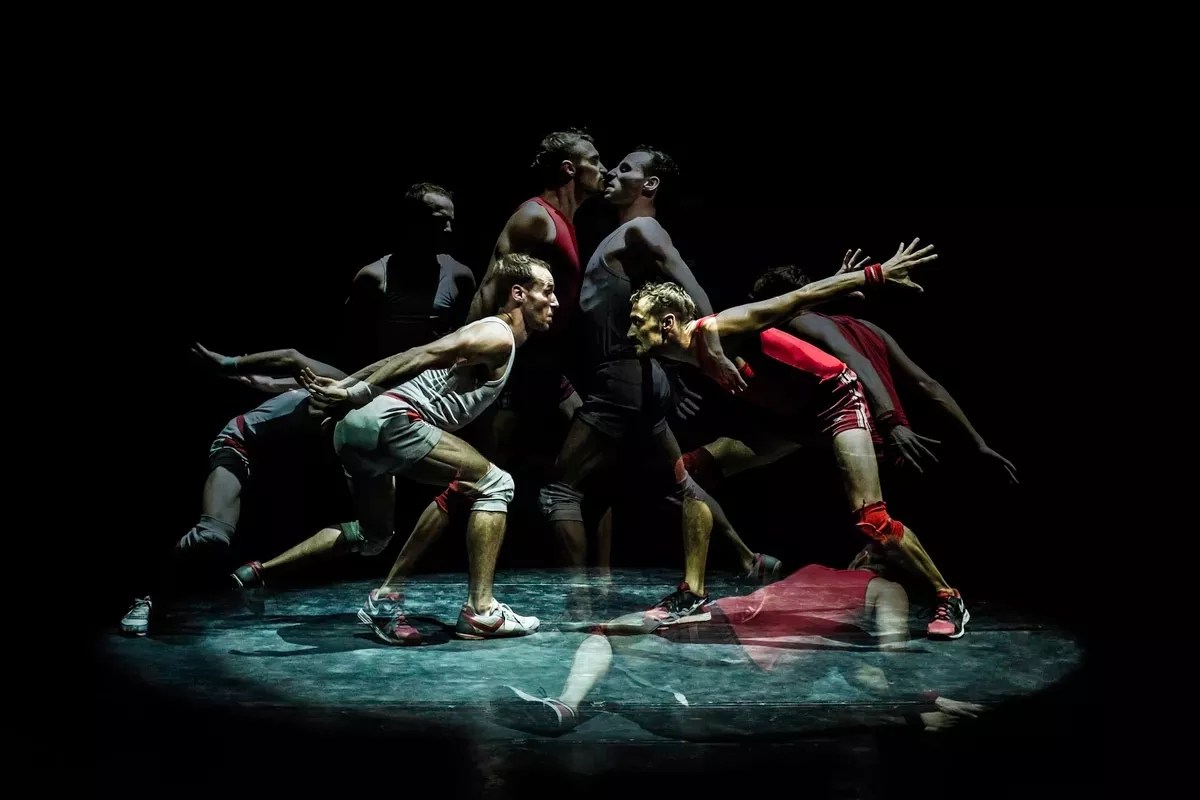
Photo by Paola Evelina

Audio By Carbonatix
It’s a small space where big things happen: the clash of egos, entrenched roughhousing, lust’s insistent hiss, a healing hilarity, and – most significantly – the vertiginous delivery of love. In this otherwise ordinary locker room, just two men in gym clothes command the action, but they might as well be a parade, so varied is the swift passage of their shifting presence.
That’s the microcosm of Un Poyo Rojo, a rollicking work of physical theater – a union of dance and cirque acrobatics, skits, and cabaret – that comes from Argentina by way of France to Miami-Dade County Auditorium on Friday, April 12, and Saturday, April 13, part of Fundarte‘s Out in the Tropics series in its 15th year.
The fun starts with the title, a play on Spanish words. Hearing it sounds like red chicken (pollo), but reading it as poyo elicits a – huh? The aha moment about these homophones comes when director Hermes Gaido explains the latter is the spelling of an uncommon term for a bench, the centerpiece of the presentation’s spare set. But, hold on to your dictionaries; therein lies a bit of the work’s history.
“The show was originally called Poggi-Rosso after its creators,” says Gaido (in Spanish, as all other respondents), referring to performer/choreographer Nicolás Poggi, who’s left the show since the 2008 collaboration that debuted at a Buenos Aires cultural center, and Luciano Rosso, still taking the stage with this throughout the world. “But one night, an announcer made the mistake of introducing the then-shorter act as pollo rojo.”
Instead of seeing red, the guys – always on watch for the double in every double entendre – saw gold, turning the gaffe into an opportunity to rename their show. Not only is a bench the platform for many of their hijinks but, as in fables where human foibles and fancies are portrayed by our fellow critters, pecking and preening are mainstays of this comedy, cockfights included with a wink.

Alfonso Barón (left) and Luciano Rosso battle it out in Un Poyo Rojo.
Photo by Paola Evelina
“We started adding on scenes,” continues Gaido, singling out his encouragement of the ever-more-candid portrayal of erotic sparks between men, which drew from the romantic relationship between the performers at the time.
“After some initial holding back,” recalls Rosso, “we realized the importance of a universal message of love in this, a reminder that, with simplicity and dedication, we could create an artistic experience empowering all of us to commune and take joy in freedom, beyond limitations, as a state of consciousness.”
The stroke of good luck sent them off on the European theater festival circuit, which to this day has brought the show great popularity and glowing critical response. Its trajectory made Fundarte founder and codirector Ever Chávez take notice, especially since he’s been on a mission for more than two decades to spotlight contemporary artists who, though celebrated abroad, are less known stateside. Sharing his enthusiasm for these performers, he contends, makes all the challenges his organization faces – visa complications and unflagging audience development at the forefront-worthwhile.
“I’ve been after this show since before the pandemic,” says Chavez. “It fits in perfectly with Out in the Tropics, not just as a gay pride thing but for the fresh perspective it brings to themes of interest to every community. Sure, this is good entertainment, but we like shows that also leave a mark on society.” He points to the work’s exploration of masculinity – whether toxic or leaning into passion – that, through all the laughter, leads to illumination.
The director’s background in clown school and aerial dance helped usher in the glee of big-top entertainment, here in very compact form. And Gaido has seen how the humor in this prelude to a kiss between men has all along served as a barometer of changing social attitudes – in earlier runs tempering scandalized reactions and more recently inviting equal-rights activists to relax a bit.
“When we eventually got set up for the long-term at one of the venues in the capital, this developed a cult following,” says Gaido. That’s where a group of French producers caught the show and invited the artists to participate in the internationally renowned Festival d’Avignon in Provence.

Luciano Rosso and Alfonso Barón star in Un Poyo Royo.
Photo by Paola Evelina
And that sense of purpose is also crucial to Alfonso Barón, who took over as Rosso’s resourceful stage opponent and conspirator in 2011. For Barón, plunging into deep subjects, past even the most flippant of surfaces, is the reason to pursue his profession – especially physical theater, where nothing is spoken but so much is said. “I’m always working away to put my focus on human relations and their whole range of emotions,” he says about his constant aim to inspire reflection.
Rosso comments, “Alfonso brought in a lot of material from his own artistic baggage. That automatically turned him into a choreographer, especially since certain moments, as when we work off live radio, are open to improvisation and invigorate the action. We play, take risks, and challenge each other.” And that lets them riff off different audience reactions and even happy accidents on scene.
Both the requisite teamwork and intense physicality were not new to Barón, who practiced rugby and extreme sports – snowboarding a preference – growing up in Mendoza, an Argentinean city at the foot of the Andes. But then he fell in love with the arts, learning from his first drama teacher to be humble in view of the myriad tasks involved in theater. “One day, he handed me a broom and asked me to sweep the stage,” says Barón. “At first, I resisted, thinking that wasn’t the great role I aspired to. But lesson learned – to respect others and pitch in first to clean up your place of work.”
Still, he confesses, “At this point in my life, my biggest concern is to take care of my body through training, injury prevention, and recovery through diet and sleep.”
All has been good preparation for the current work he considers “an incredible gift” since it’s taken him and his brotherly collaborators to more than 30 countries and past a thousand curtain calls. They’ve turned down gigs – in China, for example – where censorship aimed to tame the show. But for the most part, from kids galloping on the horseplay (Gaido values the preciousness of their unprejudiced gaze) to seniors appreciative of the stakes in the work’s worldly race, audiences have certified these men’s artistry with boisterous laughter – and occasional tears.
“It’s amazing,” says Barón, “how watching a work that lasts an hour can unleash so many questions and change your vision of the world. And that’s the pleasure we hope Miami will discover.”
– Guillermo Perez, ArtburstMiami.com
Poyo Rojo’s Un Poyo Rojo. 8 p.m. Friday, April 12, and Saturday, April 13, at the Miami-Dade County Auditorium, 2901 W. Flagler St., Miami; 305-547-5414; fundarte.us. Tickets cost $25 to $30 via ticketmaster.com.